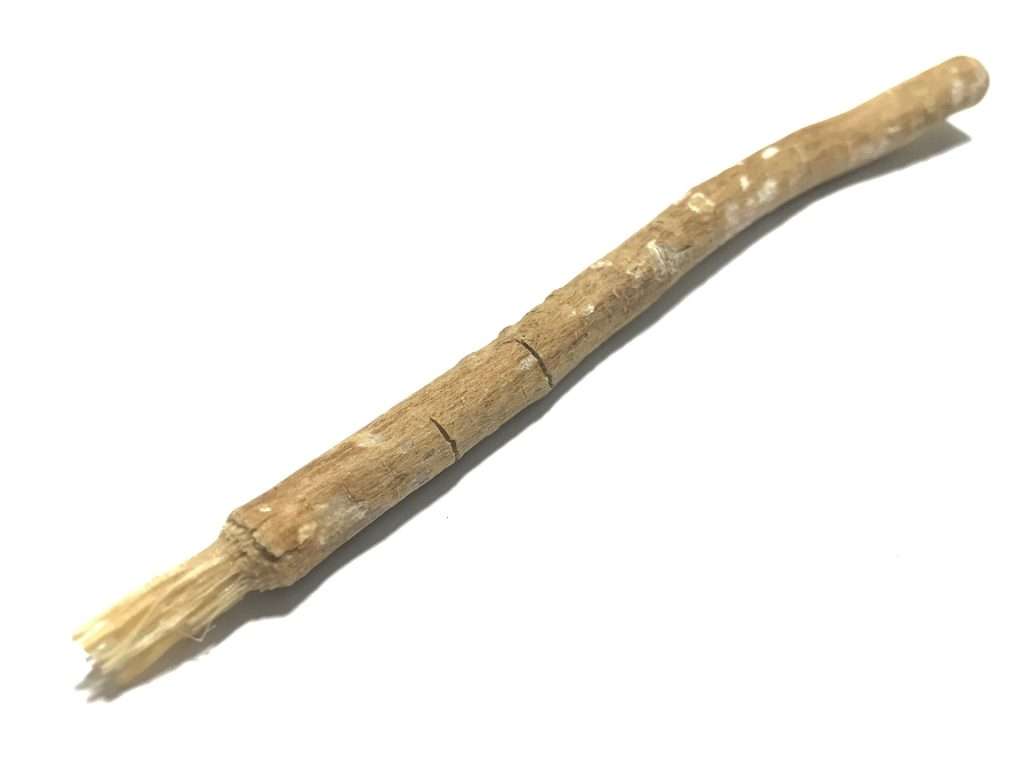Miswak is nature’s toothbrush and it has been used by people in Africa and in the Middle East for hundreds of years. It is affordable, sustainable and healing.
Miswak is nature’s toothbrush and it has been used by people in Africa and in the Middle East for hundreds of years.

The origin of the brush
The Miswak comes from the tree Salvadora Persica. It is made from small twigs from the tree. The tree itself is antibacterial, and that helps the miswak to be effectively used to remove and prevent plaque.
The content below was originally paywalled.
The World Health Organisation recommended the Miswak back in 1986, but retracted the recommendation in the year 2000. They claimed they needed more research to make such a recommendation. However, the research that had been done proved that using nature’s toothbrush was associated with a reduced need for professional dental care.
The antibacterial properties of the tree come from the presence of salvadorine and benzylisothiocyanate. The tree also contains insoluble salicylic acid, calcium, certain antioxidants and natural fluoride. As always, nature provides. It’s little wonder that the brush has been used by people successfully for hundreds of years.
Some of the benefits of the brush is its ability to help strengthen the gum, prevent tooth decay, improve tastebuds and eliminate bad breath and toothaches. It is also said to stop a decay that is already in progress.
The History of the Miswak
The Islamic prophet Muhammad recommends the use of a Miswak in the hadith. Therefore, using the Miswak has become part of believers religious practices. Muhammad recommended that one uses the Miswak after waking up in morning, before going to bed in the evening, before going to the mosque, before entering a home, before and after all journeys, and many more times throughout the day.
Here are some examples of quotations from the hadith. You can read more here.
Were it not that I might over-burden the Believers, I would have ordered them to use Siwak (Miswak) at the time of every Prayer.
Make a regular practice of Miswak for verily it is the purification for the mouth and a means of the pleasure of the Lord.
Use the Miswaak, for verily, it purifies the mouth, and it is a Pleasure for the Lord. Jib-ra-eel (A.S.) exhorted me so much to use the Miswaak that I feared that its use would be decreed obligatory upon me and upon my Ummah. If I did not fear imposing hardship on my Ummah I would have made its use obligatory upon my people. Verily, I use the Miswaak so much that I fear the front part of my mouth being peeled (by constant and abundant brushing with the Miswaak).
The Miswak Today
Today, the practice has more to do with the environment and mental health. The simplicity of using a Miswak speaks to people who are looking for simpler, slower ways of life. The practice of using the brush aligns both with minimalism values and practices, as well as the pursuit of sustainability. The twigs are therefore sold in most eco-friendly shops. They rarely cost much and they last a long time. Using one is therefore both affordable, environment-friendly and even good for mental health.
Keeping up with personal hygiene and daily habits can be incredibly difficult for those who are struggling mentally. The Miswak can be an option that makes brushing their teeth possible even at those times. To be able to do that and keep your teeth clean can save someone who is currently going through such struggles.
How do you use the Miswak?
You bite the end of the stick, either side is fine. Chew on it for a bit so that the the outer layer falls off. Underneath that thin layer, there is a brush-like centre. Use it to brush your teeth as you would use a toothbrush. When you feel you need a “new” toothbrush, it is time to cut the twig below the brush and repeat the chewing action. After that, your “new” brush is ready to be used.

Who is Miswak suitable for?
People who’re seeking natural ways to clean their teeth. Or people who have sensory issues that makes electric toothbrushes, plastic toothbrushes and/or toothpaste difficult for them to use. Whether it is the sound, the vibrating sensation, the taste, the lathering effect of the toothpaste, the feeling of the plastic – the twig could prove to be a gentler and more sensory friendly alternative. If you have a strong gag reflex, the twig could also prove to be a better option. It is also a good option for people who are looking for a budget friendly way to clean their teeth.
The Miswak is the access to multiple brushes all in one. You won’t need to buy toothpaste, plastic tooth brushes, electric toothbrushes and you won’t need to charge your electric toothbrush either. All you need is the Miswak and you’ll be good for many months ahead.
My experience of the Miswak
I have used a Miswak on and off for the last ten years or so. I use other methods at times, but somehow I always come back to the twig. My dentist has given me high praise for how clean and healthy my teeth and gums are. I have never had an issue with cavities and my teeth are white, despite me never having used any whitening treatments.
I have had issues with nausea when using a regular toothbrush and toothpaste in the past, and it became a real problem for me. That was what first led me to try the natural brush. I kept seeing it in eco shops and eventually I just decided to give it a go. It was affordable, so even if it hadn’t worked, it wouldn’t have been a big loss. But it did work. With the Miswak, I have never experienced any issues with nausea, or any sensory issues.
When I do use other types of brushes and tooth paste, I generally use compostable tooth brushes and homemade toothpaste. The Miswak is, however, still the method I prefer.
Good luck!
Discover more from Desoullife
Subscribe to get the latest posts sent to your email.
